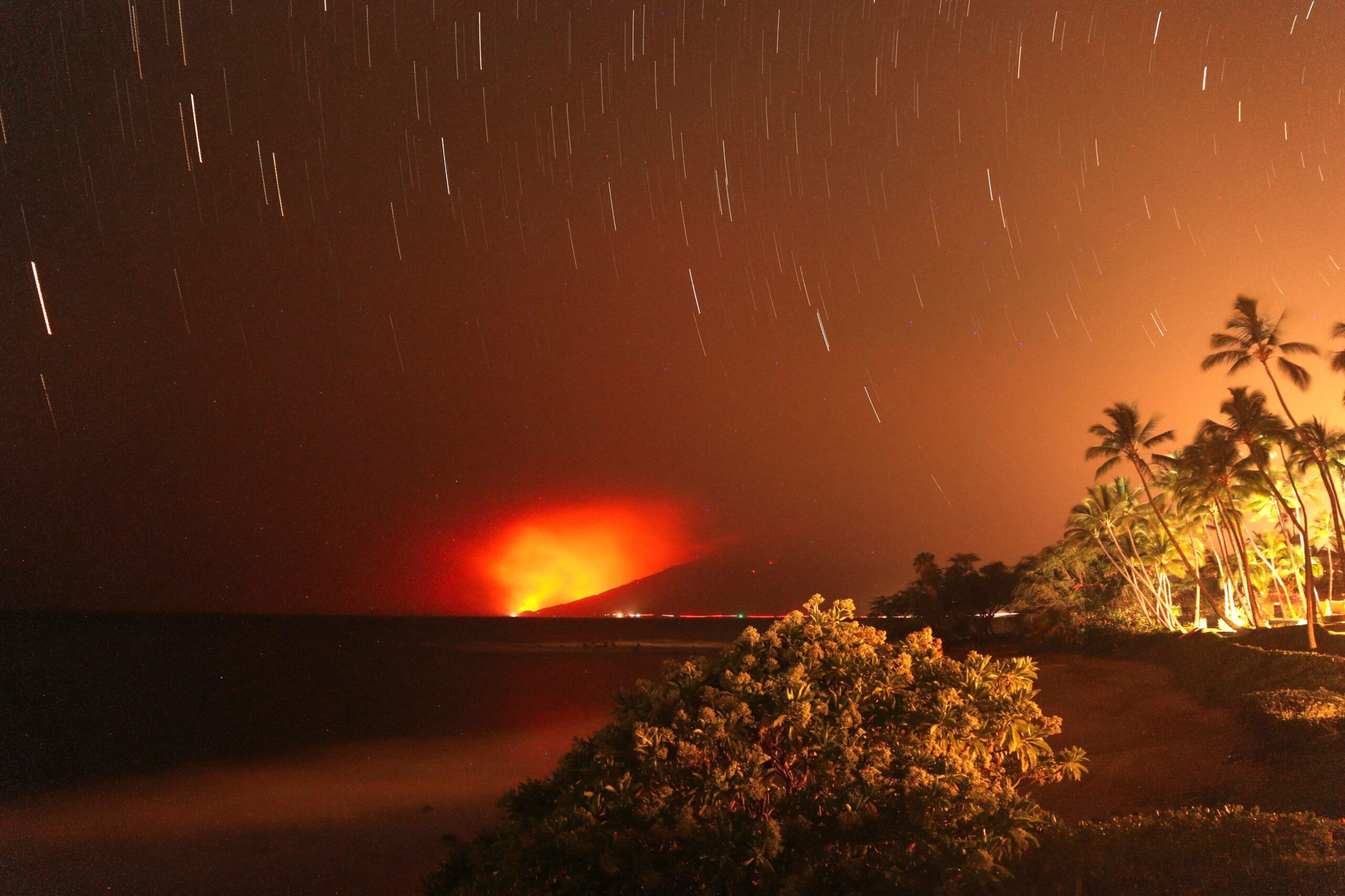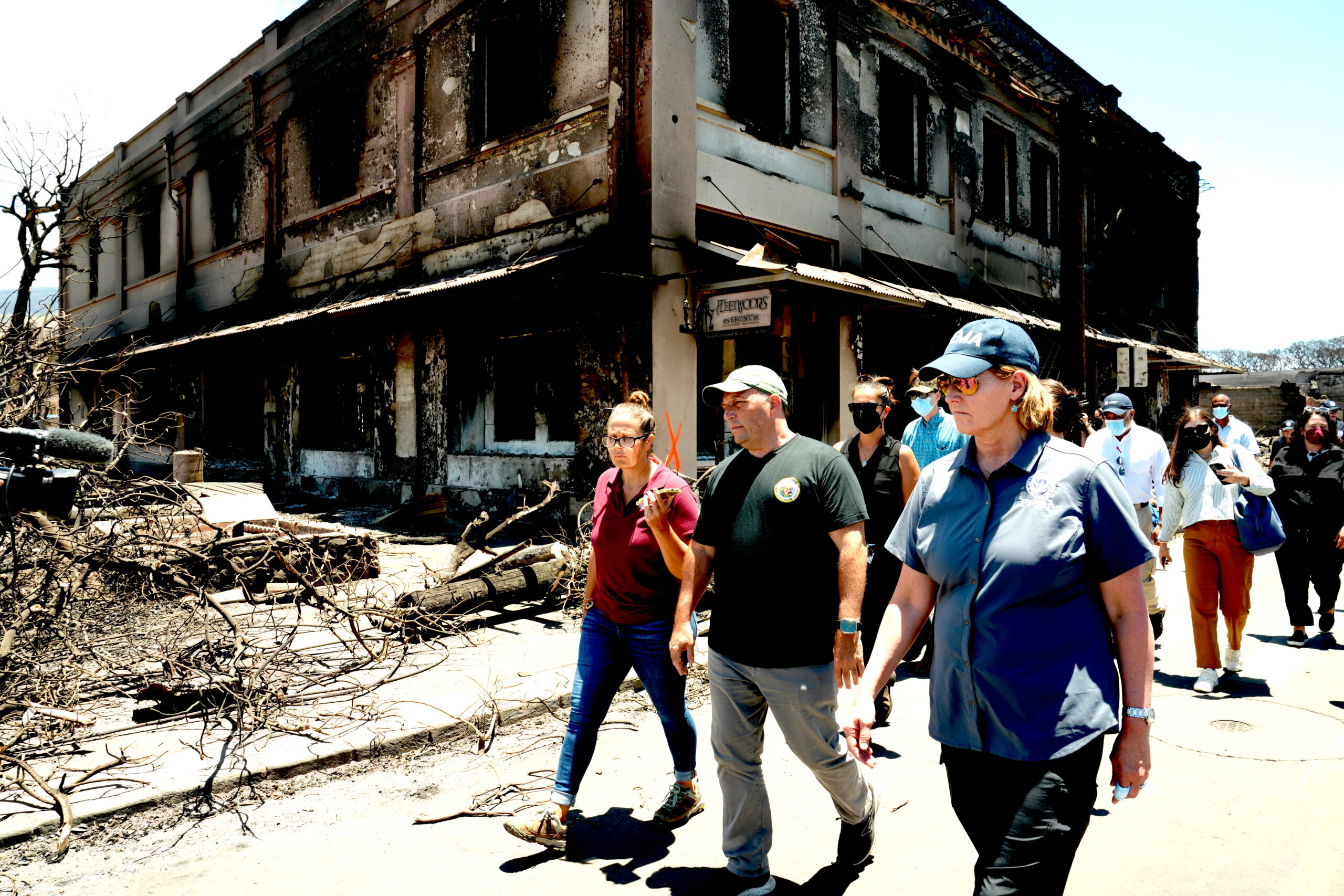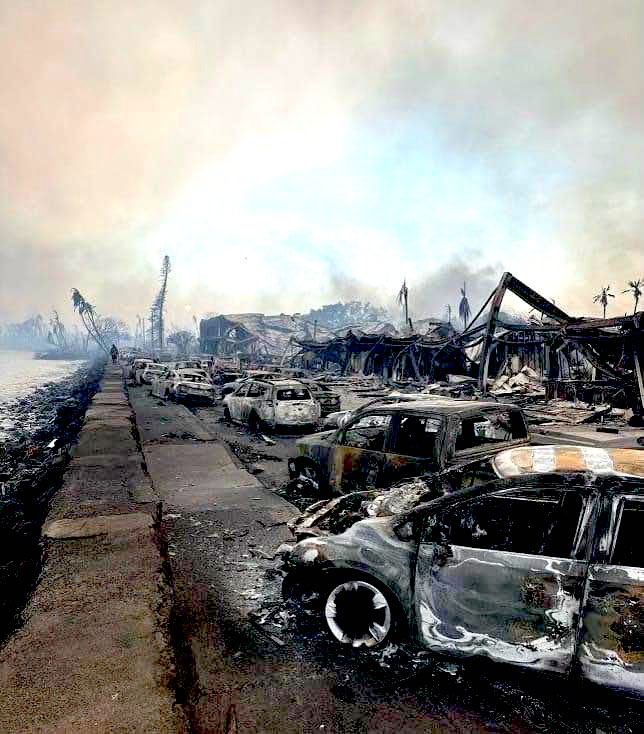Following the deadliest fire in the U.S. in over a century, local residents are worried wealthy outsiders will dominate and further serve themselves during a multibillion-dollar rebuild effort.

View of Lahaina from South Maui on the night of Aug. 8. (Wtp22, Wikimedia Commons, CC BY-SA 4.0)
By Jessica Corbett
Common Dreams
Formerly the capital of the Hawaiian Kingdom, Lahaina on the island of Maui was ravaged by a wildfire that has killed 99 people as of Tuesday, as locals fear wealthy outsiders will dominate and further serve themselves with a multibillion-dollar rebuild after the devastation in the 50th U.S. state.
“Lahaina residents worry that rebuilt homes in their Maui town could slip into the hands of affluent outsiders seeking a tropical haven rather than homegrown residents who give the Hawaiian island its spirit and identity,” The Associated Press wrote on social media Sunday, sharing new reporting from Hawaii.
Naomi Klein — author of several books including The Shock Doctrine: The Rise of Disaster Capitalism — responded with one word: “Again.”
After American expatriates and sugar planters backed by U.S. troops led the 1893 overthrow of the Hawaiian Kingdom’s Queen Lili’uokalani, the United States formally annexed the islands in 1898. Hawaii became a state in 1959.
Chronic Housing Shortage
Even before last Tuesday’s fire — which was enabled by climate-wrecking fossil fuel companies and land management decisions that have diverted water away from the area — “a chronic housing shortage and an influx of second-home buyers and wealthy transplants have been displacing residents,” the AP noted.
Richy Palalay, who had “Lahaina Grown” tattooed on his forearms when he was 16, told the outlet at a shelter on Saturday that “I’m more concerned of big land developers coming in and seeing this charred land as an opportunity to rebuild.”
Condos and hotels “that we can’t afford, that we can’t afford to live in — that’s what we’re afraid of,” said Palalay, who didn’t yet know whether the house where he rents a room for $1,000 survived the fire, which destroyed the restaurant where he works.
The Pacific Disaster Center and the Federal Emergency Management Agency (FEMA) estimate that 86 percent of the 2,719 structures in Maui County exposed to fire — the deadliest in the U.S. in over a century — were residential, and that 4,500 people may be in need of shelter and rebuilding, which could cost $5.52 billion. [The Hawaii governor warned that 10 to 20 additional bodies a day would be found for more than a week.]

FEMA, US Fire Administration and partners tour Hawaii fire damage on Aug. 12. (Dominick Del Vecchio, Wikimedia Commons, Public domain)
The AP‘s reporting on Sunday sparked warnings from Kanaka Maoli — a term Native Hawaiians use to refer to themselves — as well as campaigners and experts beyond the islands.
“Reports suggest 93 people are dead, 1,000 people missing still, and 2,700 structures destroyed,” said Uahikea Maile, a Kanaka Maoli activist and scholar and assistant professor of Indigenous politics at the University of Toronto, St. George. “The colonial speculation of disaster capitalism is happening right now in Lahaina.”
Former U.S. National Women’s Soccer League player Mana Shim, who is also Kanaka Maoli, wrote on social media:
“This is a major concern that needs our immediate attention. It’s awful to have to discuss this before we know how many have lost their lives, but anyone who knows disaster capitalism knows the urgency of protecting our ‘aina from developers and greedy malihini.”
Malihini means a foreigner, newcomer, or stranger, while ‘aina is a Hawaiian term for land or Earth.
Klein, who coined the term disaster capitalism, said, “The way I define disaster capitalism is really straightforward: It describes the way private industries spring up to directly profit from large-scale crises.”

Burned out cars and the remains of buildings in Lahaina town on Aug. 9. (US Civil Air Patrol, Wikimedia Commons, Public domain)
Some users of X, the platform formerly known as Twitter, pointed to past examples of such exploitation:
Institute for Policy Studies fellow Sanho Tree said Sunday that “disaster capitalism will happen yet again unless they act proactively.”
In an interview earlier this week with Heatmap, Kaniela Ing, a seventh-generation Native Hawaiian from Maui and national director of the Green New Deal Network, took aim at the fossil fuel companies that have heated the planet as well as mismanagement of land and water tied to “corporations that stem from the original Big Five oligarchy in Hawaii — which is the first five missionary families who control our government — rich, white, right-wing families.”
“We want to make sure that as we recover, once the direct relief efforts are done, the cameras have left — we understand that recovery will take years. And as that recovery unfolds, we want to make sure that the people, the communities, are actually empowered to rebuild themselves, that we don’t open the door for disaster capitalists,” Ing said.
“Unfortunately, the institutions best poised to distribute direct aid are also the most likely to enable disaster capitalists to exploit this tragedy,” he continued. “They’re actively raising millions and once the spotlight moves from our island, what’s to come of those monies, and who’s really going to benefit? Those are questions that I think we need to be really proactive about answering on our own as community organizers.”
“And maybe in this opportunity — like, we all understand that we’re going to have to be lobbying for additional FEMA funds, federal funds, state and local funds,” he added. “We want to make sure that the people, the forces that contributed to this problem in the first place, are pushed out of power for a more community, ground-up sort of infrastructure. So there’s a lot of mutual aid and power building that needs to happen immediately.”
Jessica Corbett is a staff writer for Common Dreams.
This article is from Common Dreams.
Views expressed in this article and may or may not reflect those of Consortium News.

Disaster Capitalism, is just plain capitalism. Unlimited “private property” enables a few oligarchs to control vast tracts of land and real estate- disaster or not. Native Hawaiians have been displaced economically from their ancestral homeland – there are more indigenous Hawaiians on the mainland (especially in the Las Vegas area) than on the islands themselves.
In 1893, the US haoles arrested Queen Lili’uokalani and seized control of Hawaiian government – illegally.
Pres. Clinton apologized for this act in 1993, however nothing was done to make amends. As usual, the apology was just empty PR. However, it could be used as evidence of the illegality and admission of guilt in future litigation.
In other words, Hawai’i was STOLEN at gunpoint. To this day, oligarchs like Larry Ellison (owns the entire island of Lana’i ) Mark Zuckerberg, and other billionaire mainlanders have bought huge tracts of land on the islands. It has become a super-expensive enclave of the filthy rich. Prices have been driven sky-high and few can afford to live there anymore. The ethnic cleansing will continue and the capitalist oligarchy will continue to monopolize the land and resources.
The ethnic cleansing of Hawai’i will continue and accelerate if nothing is done.
From comments made by survivors, school were closed for the day, so the bodies left to be found will be children; there was no aide response from a large military base, firefighters, no warning horns, water was turned off so you couldn’t protect your home, and people were blocked from leaving the area on fire and now aid is being blocked. And to top it off, insurance is telling insured they were out of conformity to something and insurance won’t pay. It all sounds like disaster capitalism at work to me.
Well —-Oprah was already handing out supplies to help people. But I wonder, does she really need all of that land that she just bought? Considering that rich people have already changed the Hawaiian lands—-maybe Oprah could get the land to do more than just help people to visit.
And so Oprah, wherever you are—- perhaps YOU could start the best ever environmental group to create jobs and work that could help the Hawaiian lands and the Hawaiian people improve in terms of making the land healthier, as truly, hotels aren’t truly that healthy. But as a non Hawaiian you could certainly help these exquisite lands and make the Hawaiians and the world a better place at the same time.
The way communities are eventually rebuilt is never reported, it would be informative if the the Author and commenters have specific examples of disaster capitalism, and what communities have been to accomplish resisting it.
Read Naomi Klein’s Disaster Capitalism. Well worth it.
Oh, pul-lease. Can you really believe “local residents,” unless they’re rolling in dough, have any hope of prevailing after this tragedy? That’s what capitalism IS–rewarding the wealthy for cutting down the non-wealthy. I can just see the eyes of the exploiters lighting up as they learn of the fire: “Yippee–we’re off to the bank!”
Exactly. They’re screwed.
Unfortunately I agree.
So so sad.
The American “corrupgarchy” at work…again and as usual.
I am curious how FEMA calculates there numbers. I would love to see an article on that.
“Federal Emergency Management Agency (FEMA) estimate that 86 percent of the 2,719 structures in Maui County exposed to fire — the deadliest in the U.S. in over a century — were residential, and that 4,500 people may be in need of shelter and rebuilding, which could cost $5.52 billion.”
Population of Lahaina 13,000. 2719 structures divided into 5.52 billion is a little over two million a structure. Seems a little pricey for the average house.
We should look up the tax value of those places.
Reports are that the fires were caused by power lines that came down. The power company should have turned them off. And keep in mind that this is the dry part of Maui where there is an average of only 12 inches of rain per year. So I’m not sure that these fires were caused by climate change.
I have doubts also that climate change is the culprit. Too many coincidences like Turkey’s relationship with Russia and then the devastating earthquake and Turkey does a 180.
People with money and the power that comes along are often looking for bargain opportunities. And capitalism is a semi-automatic process to help money find a place to invest itself for profit. There is no ‘shock doctrine’ and there is no ‘disaster capitalism’. There are humans, who can be selfish and greedy, and there is capitalism, which amplifies those tendencies.
That’s why capitalism must die. It is not good for the earth or the people on it.